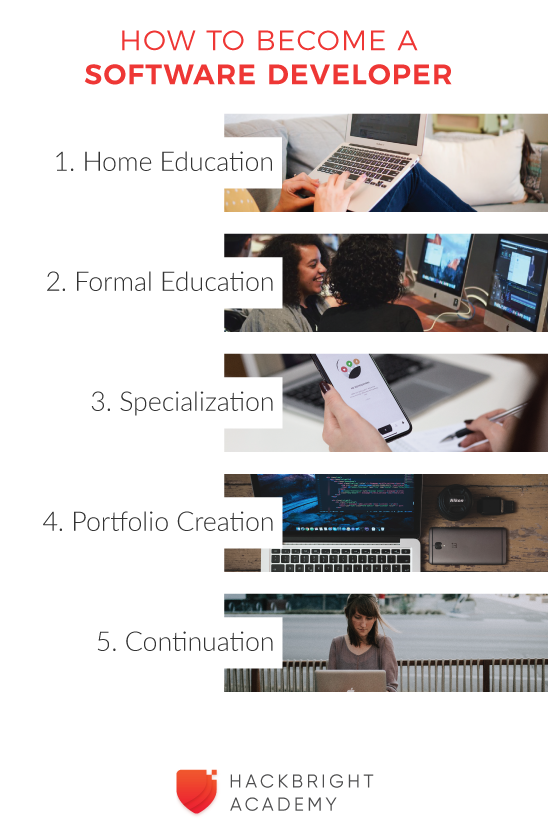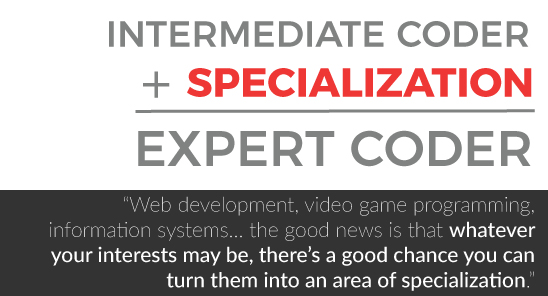Sometimes it seems like there’s so much mystery around coding and programming, that it takes on an almost magical quality. And when people ask about how to become a software developer, it’s almost like asking about learning how to fly.
But the truth is that there’s nothing magical about code (other than the absolutely miraculous things you can do with it). Programming is a skill set that many people can learn with hard work, persistence, and a little help from the pros.
That said, making the journey toward a career in software engineering takes more than just a passing interest. It takes dedication, passion, self-discipline, and a willingness to put yourself outside of your comfort zone. And it doesn’t hurt to have a team of mentors and instructors to support you along the way.
It’s not a journey you’ll have to take alone. Hackbright Academy is dedicated to giving women, gender diverse people, and their allies from diverse backgrounds the power and skills needed to build long and successful careers in the tech industry. To that end, we’ve put together this simple guide on how to become a software engineer.
In This Guide, We’ll Cover the Following Steps:
- Home education
- Formal education
- Specialization
- Portfolio creation
- Continuation
Step 1: Home Education
If you want to land a rewarding job in software engineering, your first step will probably be taken at home, on your own initiative. Sure, there are software developers today who walked into their first coding class without even a clear idea of what a programming language is, much less any personal coding experience. But for the majority of developers, the question of how to become a software developer starts off as “how to become a software developer at home.”
The good news is that there are a number of free coding resources (including templates and tutorials) available online. YouTube channels dedicated to bringing up new coders offer clear, visual instruction. Additionally, Hackbright Academy offers a free set of Python modules to help beginners get started with helpful exercises.
So, before you ever start taking formal classes, focus on your informal coding education. The more of a coding background you can develop at home, the better foundation you’ll have once class starts.
Step 2: Formal Education
Now, before we go on, it’s worth pointing out that it is entirely possible to become a software developer, completely self-taught. If you put in enough effort and make good use of available resources and Massive Online Open Courses (MOOC), you can learn how to become a software developer without formal training.
Still, formal education will give you advantages that self-taught coders don’t have, and we’re not just talking about certification (which can be a pretty big deal to some employers). We’re talking about a clear understanding of computer-science theory and processes. We’re talking about built-in support and networking resources. We’re talking about hands-on coding experience, with portfolio-worthy projects to showcase your work.
By attending classes and working with instructors, you’ll have access to mentors who are committed to seeing you succeed not only in the classroom but also in your career.
When it comes to getting a formal education, you have two general options: Pursue a computer science degree (via college courses), or go through an accelerated software engineering school or coding bootcamp. The choice is yours.
Software engineering schools and bootcamps, on the other hand, are designed to produce informed, educated software development professionals in as little as a few months. And because of the specialized, accelerated nature of these options, tuition is usually a fraction of what you’d be paying a University.
Step 3: Specialization
So you’ve gotten your certification and developed the skills you need to get your foot in the door. Well, don’t stop there. Turn yourself from an intermediate coder into an expert, by pursuing a specialization.
What kind of specialization should you go after? It all depends on your passion. If you really enjoy working with a specific programming language, there’s nothing wrong with focusing your ongoing study just on that language. If you’re interested in software development for mobile devices, then make that your primary concentration.
Web development, video game programming, information systems… the good news is that whatever your interests may be, there’s a good chance you can turn them into an area of specialization. And by pushing the boundaries of your education beyond the baseline, you’ll be making yourself an even more valuable asset to potential employers.
Step 4: Portfolio Creation
Certification is one thing that most employers look for when hiring for a software development position. The other thing is skill. And other than a technical interview, often the best way to demonstrate your coding and software engineering skills is through your portfolio.
A portfolio will give you the ability to showcase some of the projects you’ve worked on. As such, if you’re applying for a specific position, you’ll want to build a portfolio that demonstrates the skills that position requires.
Does that mean building a new portfolio prior to every job interview? Not necessarily, but it could mean doing enough research into the position and tweaking your portfolio to better showcase the right talents.
Thankfully, many coding bootcamps provide portfolio assistance, helping students decide what to include and how best to present their work for prospective employers. And often, mentoring resources remain available even after the course has been completed. So, when a new chance comes along, you’ll be able to do the necessary portfolio tweaking to capture it.
View some of Hackbright Academy alumnus’ student portfolios.
Step 5: Continuation
Landing a job in software engineering may seem like the destination, but the truth is it’s just another step in a rewarding, ongoing journey.
That’s because software development is a dynamic career path. In fact, you could think of it as a river — the current of software development is always flowing, and if you try to sit still and tread water, you’re only going to get pushed downstream.
New advances are constantly revolutionizing and adding to the world of programming. So, if you want to keep up, you’ll need to work at it.
But really, that’s not as hard as it may sound. If you’ve got the passion, then keeping up with new advances should be second nature. And as you learn and grow in your career, you’ll see that when it comes to software engineering, the sky really is the limit.
Hm. Maybe it is like learning to fly, after all.
Ready to get started? Apply to Hackbright Academy today, and together let’s make some coding magic.



